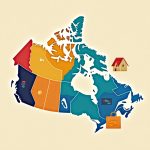Toronto, the bustling heart of Canada, is a city of dreams, diversity, and, let’s face it, daunting expenses. From the iconic CN Tower to the vibrant streets of Kensington Market, Toronto offers a lifestyle that’s hard to resist. But here’s the million-dollar question—or rather, the $50,000 question: Is $50,000 a good salary in Toronto? Financial guru Dave Ramsey once said, “A budget is telling your money where to go instead of wondering where it went.” In Toronto, that budget better be tight. Renowned economist Thomas Piketty has highlighted the growing income inequality in urban centers, and Toronto is no exception. Meanwhile, personal finance expert Suze Orman emphasizes the importance of living within your means, a mantra that rings especially true in a city where the cost of living can feel like a heavyweight champion. So, can you thrive—or even survive—on $50,000 a year in Toronto? Let’s unpack this financial puzzle piece by piece.
The Cost of Living in Toronto
Living in Toronto is like being in a relationship with a high-maintenance partner—it’s exciting, but it’ll cost you. Let’s break down the major expenses you’ll face on a $50,000 salary.
Housing Costs
If you’re dreaming of a one-bedroom apartment in downtown Toronto, prepare to shell out around $2,200 per month. That’s more than half of your $50,000 salary gone before you’ve even paid for groceries. According to the Canada Mortgage and Housing Corporation, Toronto’s housing market is one of the most expensive in the country. Renting vs. buying? Forget about buying unless you’ve got a hefty down payment saved up. And don’t forget the hidden costs—utilities, maintenance, and that pesky tenant insurance can add up quickly.
Transportation Expenses
Public transit is your best friend in Toronto, with a monthly TTC pass costing around $156. Owning a car? That’s a luxury. Between insurance, gas, and parking, you’re looking at an additional $500-$700 per month. If you’re feeling adventurous, biking is a great option—just watch out for those potholes. Ride-sharing services like Uber and Lyft are convenient but can quickly drain your wallet.
Food and Groceries
Groceries in Toronto aren’t cheap, with the average single person spending around $300-$400 per month. Dining out? A meal at a mid-range restaurant can set you back $20-$30. Cooking at home is the way to go, but even then, you’ll need to shop smart. Look for deals at stores like No Frills or Walmart to stretch your budget.
Entertainment and Lifestyle
Toronto is a city that never sleeps, but your wallet might. A gym membership can cost $50-$100 per month, and a movie ticket will set you back around $15. But don’t despair—there are plenty of free and low-cost activities, from exploring the High Park to attending free concerts at the Toronto Events calendar. Balancing your lifestyle with a $50,000 salary is all about prioritizing.
Savings and Emergency Funds
Saving money on a $50,000 salary in Toronto is like trying to fill a bathtub with a teaspoon—it’s slow going, but every bit counts. Aim to save at least 10% of your income, which would be $5,000 per year. An emergency fund is crucial in a high-cost city, so start small and build it up over time. Consider using a high-interest savings account from a bank like Tangerine to maximize your savings.
Comparing $50,000 to Toronto’s Average Income
Let’s be real—$50,000 in Toronto sounds like a decent chunk of change until you realize a single avocado toast brunch downtown could cost you $25. So how does this salary actually stack up against what most Torontonians earn? Spoiler alert: it’s a tightrope walk between "surviving" and "thriving."
Median Household Income in Toronto
The latest StatsCan data reveals Toronto’s median household income hovers around $85,000—meaning half the city earns more, half earns less. A $50K salary? You’re dancing in the lower third. Neighborhoods like Rosedale (median income: $190K) will have you side-eyeing Tesla drivers, while areas like Malvern ($55K) feel more relatable. Pro tip: follow the Toronto Star’s affordability beat for survival hacks.
Tax Implications
Ah, taxes—the ultimate buzzkill. On $50K, you’ll lose roughly 20% to federal and provincial taxes, leaving you with about $3,300/month. Fun fact: that’s just enough for a monthly coffee habit at Toronto’s hipster cafés, plus rent in a CMHC-approved shoebox. Use Wealthsimple’s tax calculator to see exactly how much gets clawed back.
Cost of Living vs. Income
Here’s where it gets spicy. The Numbeo Cost of Living Index shows Toronto is 24% pricier than Montreal. Breakdown:
- Housing: 45-60% of your take-home pay (kiss that TIFF VIP pass goodbye)
- Transport: $156/month for a TTC pass—or $300+ for car insurance if you dare
- Groceries: $300-$400/month if you avoid Whole Foods’ artisanal kale
Meanwhile, cities like Winnipeg offer similar salaries with 30% lower costs. Food for thought—literally.
Challenges of Living on $50,000 in Toronto
Affordable Housing Crisis
Finding affordable housing in Toronto is like hunting for a unicorn riding a TTC streetcar. The average one-bedroom now costs $2,500/month, forcing $50K earners into creative solutions:
- Basement apartments with "charming" mold accents
- Six-person roommate setups (hello, TorontoRentals.com desperation)
- Commuting from Hamilton and pretending you love GO Transit
The City’s social housing waitlist has 81,000 households—you’ll retire before your number’s called.
Limited Disposable Income
With 70% of income gone to necessities, "disposable income" becomes a myth. Want to:
- Save for retirement? Hope you like CPP and prayers.
- Take a vacation? Ontario Travel has great staycation ideas (read: your couch).
- Date? Swipe left on anyone who suggests CN Tower dinners.
Impact on Mental Health
Financial stress is Toronto’s unofficial pastime. A CAMH study found 38% of residents experience money-related anxiety. Free fixes:
- Toronto Public Library’s free wellness programs
- 211 Ontario’s crisis support lines
- Screaming into a pillow while watching Toronto FC games (therapeutic)
Strategies to Make $50,000 Work in Toronto
Living in Toronto on $50,000 a year isn’t easy, but it’s far from impossible. The key? Smart financial moves, creative problem-solving, and a willingness to adapt. Here’s how to stretch your dollars further without feeling like you’re missing out.
Budgeting Like a Pro
First, ditch the mental math. A budgeting app like Mint or YNAB can track every dollar automatically. Break your spending into categories:
- Essentials (50-60%): Rent, groceries, transit.
- Savings (10-20%): Emergency fund, retirement.
- Flexible (20-30%): Dining out, hobbies, Netflix.
Toronto’s rental market is brutal, but sharing a two-bedroom with a roommate could slash your housing costs by 40%. Use the savings to attack debt or invest.
Side Hustles: The Toronto Grind
Turn downtime into cash. The gig economy thrives here:
- Delivery driving: Uber Eats or SkipTheDishes can net $20+/hour.
- Freelancing: Sell skills on Upwork (writing, graphic design).
- Odd jobs: TaskRabbit pays for assembling IKEA furniture or helping with moves.
Even 10 extra hours a week at $20/hour adds $800/month—enough to cover groceries and a weekend escape to Ontario Parks.
Cut Costs Without the Pain
Small tweaks add up fast:
| Expense | Typical Cost | Smart Swap |
|---|---|---|
| Gym membership | $60+/month | Free city rec centers or YouTube workouts |
| Coffee | $150/month | Brew at home + occasional treat |
| Data plan | $80/month | Switch to Public Mobile ($35 for 5GB) |
Pro tip: Use Flipp to price-match groceries at No Frills or FreshCo.
Long-Term Financial Planning
Surviving is one thing; thriving is another. Here’s how to build wealth—even on $50K.
Investing: Start Small, Think Big
Forget "get rich quick." Focus on steady growth:
- Robo-advisors: Wealthsimple lets you invest spare change with $1.
- ETFs: Low-fee funds like Vanguard’s VGRO diversify your risk.
- TFSA first: Grow tax-free (up to $6,500/year in 2023).
Even $100/month at a 7% return becomes $20,000 in 10 years—enough for a down payment on a Toronto condo.
Crush Debt Like a Torontonian
Debt drags down your future. Attack it:
- Snowball method: Pay smallest debts first for quick wins.
- Balance transfers: Move credit card debt to a 0% APR card.
- Student loans: Apply for repayment assistance if needed.
Future-Proof Your Life
Toronto’s expensive, but your dreams don’t have to be:
| Goal | Strategy |
|---|---|
| Homeownership | Save via First-Time Home Buyer Incentive |
| Career growth | Free courses at Toronto Public Library |
| Retirement | Automate RRSP contributions (even $50/month) |
Remember: The average Canadian earns $54,630—you’re closer than you think.
AI Solutions: How Could AI Help?
Artificial Intelligence (AI) is no longer just a buzzword; it’s a transformative tool that can revolutionize how we manage our finances, find housing, and even improve our mental health. For those living on a $50,000 salary in Toronto, AI offers innovative solutions to stretch every dollar and optimize resources. Here’s how AI can be a game-changer:
Personalized Budgeting Tools
AI-powered budgeting apps like Mint and YNAB analyze your spending habits and provide actionable insights. These tools categorize expenses, identify areas where you can cut costs, and even predict future spending patterns. For example, if you’re spending too much on dining out, the app might suggest meal prepping as a cost-effective alternative. By leveraging AI, you can create a budget that aligns with your financial goals and lifestyle.
Automated Savings and Investment Platforms
Robo-advisors like Wealthsimple and Betterment use AI to manage your investments with minimal effort. These platforms analyze your risk tolerance and financial goals to create a diversified portfolio. Additionally, apps like Qapital round up your purchases and automatically transfer the spare change into a savings or investment account. This “set it and forget it” approach makes saving and investing accessible, even on a tight budget.
Job Market Optimization
AI can also help you increase your income by matching you with higher-paying job opportunities. Platforms like LinkedIn and Indeed use AI algorithms to recommend jobs based on your skills and experience. Additionally, AI-driven platforms like Coursera and Udemy offer affordable courses to upskill and make you more competitive in the job market. By leveraging these tools, you can unlock new income streams and improve your financial stability.
Housing Solutions
Finding affordable housing in Toronto can feel like searching for a needle in a haystack, but AI can simplify the process. Platforms like Zillow and PadMapper use AI to filter listings based on your budget and preferences. AI algorithms can also predict rent trends, helping you time your move for maximum savings. For those struggling with high rent, AI-powered platforms like Roomster can help you find compatible roommates to split costs.
Mental Health Support
Financial stress can take a toll on your mental health, but AI-driven tools can provide support. Chatbots like Woebot offer 24/7 emotional support and coping strategies. Virtual financial advisors, such as those offered by Cleo, provide personalized advice to reduce financial anxiety. By integrating AI into your mental health routine, you can build resilience and maintain a positive outlook.
Action Schedule/Roadmap (Day 1 to Year 2)
Here’s a detailed roadmap to implement AI solutions and achieve financial stability in Toronto:
- Day 1: Download an AI-powered budgeting app like Mint or YNAB and input your financial data.
- Week 1: Use the app to create a detailed monthly budget and identify areas to cut costs.
- Week 2: Explore robo-advisors like Wealthsimple and open a low-cost investment account.
- Month 1: Enroll in an AI-driven upskilling platform like Coursera to enhance your job prospects.
- Month 2: Use AI-powered housing platforms like Zillow or PadMapper to find affordable living options.
- Month 3: Start using a mental health chatbot like Woebot to manage financial stress.
- Year 1: Evaluate your progress and adjust your financial plan based on AI insights.
- Year 1.5: Automate savings and investments using platforms like Qapital and Betterment.
- Year 2: Achieve financial stability with a diversified portfolio, emergency fund, and reduced stress.
Making $50,000 Work in Toronto: A Path Forward
Living on $50,000 in Toronto is undoubtedly challenging, but it’s far from impossible. With the right strategies and tools, you can turn this income into a foundation for financial stability and even growth. AI is your ally in this journey, offering personalized solutions to stretch your budget, increase your income, and improve your quality of life. From budgeting apps to robo-advisors, the technology is here to help you navigate the complexities of living in one of Canada’s most expensive cities.
But beyond the numbers, it’s about mindset. Toronto is a city of opportunity, and with determination and creativity, you can thrive here. Whether it’s finding a side hustle, cutting unnecessary expenses, or leveraging AI to optimize your finances, every step you take brings you closer to your goals. Remember, financial stability isn’t just about surviving—it’s about building a life you love in a city that inspires you.
So, what’s your next move? Will you embrace AI to take control of your finances? Or will you explore new ways to increase your income and reduce your expenses? The choice is yours, and the tools are at your fingertips. Toronto is waiting for you to make your mark.
For more local insights, check out Toronto News.
FAQ
Q1: Can I afford to live alone in Toronto on $50,000?
Yes, you can, but it requires careful budgeting. The average rent for a one-bedroom apartment in Toronto is around $2,000 per month, which is a significant portion of your income. To make it work, consider living in more affordable neighborhoods like Scarborough or North York. You’ll also need to cut costs in other areas, like transportation and entertainment.
Q2: How much should I spend on rent with a $50,000 salary?
Financial experts recommend spending no more than 30% of your income on rent. For a $50,000 salary, that’s about $1,250 per month. However, finding a place at this price in Toronto can be challenging. Consider sharing an apartment or looking for basement suites to stay within your budget.
Q3: What are the best ways to save money in Toronto?
Here are some practical tips to save money in Toronto:
- Use public transit like the TTC instead of owning a car.
- Cook at home instead of dining out frequently.
- Take advantage of free entertainment options like parks, festivals, and community events.
- Shop at discount grocery stores like No Frills or FreshCo.
Q4: How can AI help me manage my finances?
AI-powered tools can make managing your finances easier and more efficient. Apps like Mint and YNAB can track your spending, create budgets, and even suggest ways to save. Robo-advisors like Wealthsimple can help you invest with minimal effort.
Q5: Is it worth living in Toronto on a $50,000 salary?
It depends on your priorities. Toronto offers incredible cultural diversity, job opportunities, and a vibrant lifestyle. If you’re willing to make sacrifices and budget carefully, it’s possible to enjoy the city on a $50,000 salary. However, if financial stress is a concern, you might want to explore more affordable cities like Calgary or Ottawa.
Q6: How can I find affordable housing in Toronto?
Finding affordable housing in Toronto can be tough, but here are some strategies:
- Check out listings on Kijiji or Facebook Marketplace.
- Apply for subsidized housing through the City of Toronto.
- Consider shared living arrangements or renting a room instead of an entire apartment.
Q7: What are some free or low-cost activities in Toronto?
Toronto has plenty of free or affordable activities to enjoy:
- Visit the Royal Ontario Museum on free admission days.
- Explore the Toronto Islands for a day of outdoor fun.
- Attend free concerts and events at Yorkville Village.
Q8: How can I improve my credit score while living in Toronto?
Improving your credit score is essential for financial stability. Here’s how:
- Pay your bills on time, including rent, utilities, and credit cards.
- Keep your credit card balances low and avoid maxing out your cards.
- Check your credit report regularly through TransUnion or Equifax to spot and fix errors.
Q9: What are the best neighborhoods for affordable living in Toronto?
Some neighborhoods in Toronto are more budget-friendly than others. Consider areas like:
- Scarborough: Offers lower rent and a suburban feel.
- Etobicoke: A mix of affordability and accessibility.
- North York: Close to downtown but more affordable.
Q10: How can I prepare for unexpected expenses on a $50,000 salary?
Building an emergency fund is crucial. Start by setting aside a small amount each month, even if it’s just $50. Use a high-interest savings account from banks like Tangerine or EQ Bank to grow your savings faster. Aim to save at least three to six months’ worth of living expenses.
For more local insights, check out Toronto News.
Wait! There's more...check out our gripping short story that continues the journey: It Wasn’t About Surviving on $50K
Disclaimer: This article may contain affiliate links. If you click on these links and make a purchase, we may receive a commission at no additional cost to you. Our recommendations and reviews are always independent and objective, aiming to provide you with the best information and resources.
Get Exclusive Stories, Photos, Art & Offers - Subscribe Today!





























Post Comment
You must be logged in to post a comment.